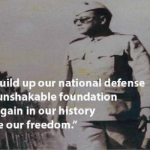THE MAN WHO LOVED HIS SPLINTERS
The sun shone over the Arakan hills. The hills looked harmless and newly greened after the monsoons. The latest new race of yellow-faced, buck-toothed men which had come to conquer India was stuck in these green hills. They had gnawed and snapped and charged at eastern gates of India but were halted in the Battles of Kohima and Imphal. Now it was the defenders turn to hunt the wolves at the house gates.
A sepoy sat on an upturned water can peeling the old potatoes. The potatoes had shrivelled like the flesh of old people. He was a hard-working young man of a quiet and sincere disposition, the kind of man who did his job quietly and thoroughly and timely. Such men are the boots of the army that carry the behemoth machine of war-making. This machine also needed rest, sleep, food and hope. He saw the Dakota planes to the west behind their battalion line. White parachutes were falling like snow-flakes. Aerial supply was going on. He wondered if he would get a letter from home. The postal bag also came along with potatoes and onions and tinned food, slung to a parachute.
The war had come as God-gifted chance to break the cycle of debt. His family was utterly poor and debt-ridden. The dry rattle of poverty was all that he had felt ever since he was born. One day he told his father, “I am going to get enrolled, there are a lot of vacancies and they are calling for volunteers.”
He was past the age of recruitment, but those were days when birth certificates were not in vogue. He went and stood in the mile long recruitment line. He was fit and strong from all the farmwork he had been doing, since he could walk. His pay had been going to his father. Nobody needed money here in these Burmese jungles. He was happy with the sarkar. His father had cleared off the family debts.
All these thoughts formed an overtone in his mind and he felt he was living a charmed life. He saw the crows sitting on the mess tent waiting to explore the heap of potato skin and onion peels. The November sun felt warm like a shawl on his skin. He was sitting in khaki shorts and a white cotton vest, working in the mess. He didn’t mind the work at all, in fact he looked forward to being given different duties; sometimes caring for the sick in the long field ambulance tent, sometimes going on patrols into the jungles to spot and fix the presence of Japanese. One day he had been sent with a squad of army propaganda team with loud speakers into the jungles towards enemy positions. He had been puzzled at the site of those loud speakers and batteries he and others had to carry. Then from a guarded place, the loud speakers were laid facing the Japanese lines. The Indian officers and NCOs started exhorting the spirits of the forests, it seemed. Who was going to hear them?
“Surrender to the nearest Unit and you can go home. No harm will come to you. We know you switched sides to survive the hardships and the torture. Do not fight your Indian brothers. You are fighting for a side that does not wish you well. The Japanese sarkar has no real love lost for you.”
These educated men moved all along the forest blaring out from their speakers to the enemy positions. On returning to their lines, the men were told that they were not to talk about what they heard and saw with anyone else. If they did, it would be a punishable offence. Then there was talk in the battalion that their commanding officer sahib would now be a Hindustani officer. All their Angrez sahib log would be replaced by Hindustani officers. But the sepoys knew that it made no difference to them. They were the ones who were meant to take bullets on their chests, whatever the colour of their officers’ skin. All of them knew that independence was around the corner after the war. That is why Hindustani officers were being given high positions in the army now. Nevertheless, if new conquerors came to rule India, it might take another hundred years to get rid of them.
Fairley sahib, their Angrez CO sahib, was on his way out. There was a hill overlooking their battalion position at Razabil, which was a Japanese stronghold. The last order Fairley sahib gave was for the capture of this hill. He was peeling potatoes in the officers’ mess when his Platoon Havildar came and shouted for all chaps of his company to go and get ready. They were all issued two hand grenades and a hundred rounds of bandolier ammunition each for their rifles.
There he was working in the mess, watching the gently drifting parachutes and thinking of home. And the next moment here he was all trussed up, with a tin helmet on his head ready to move off towards the hill held by the Japanese. The enemy position had sheer vertical sides and they had taken great care to select an impregnable spot. The only approach was from a narrow ridge up a sheer slope. The platoon climbed up on all fours, helping and pulling each other up into the wooded hill side.
His was the leading platoon and he was in the forward most section. The enemy was cleverly camouflaged and none could make out where they were. Machine gun fire tore through the jungle and he felt the high velocity kick of hot bullets on his left shoulder and legs. Hell, it was all so sudden. He was flung to the ground and he took the name of Ram. He looked around. He had seen his comrades fall and now they lay red and dead and hot as freshly torn stone. He felt his soul tugging in the cage of his flesh, squirming to quit and fly away.
The enemy was raining fire and a machinegun was spitting. The rest of the company behind him was pinned down the slope with Zorawar Chand Bakshi sahib, the officer who was leading the attack. The Japanese came out of their trenches to look over the dead bodies. He knew what would happen if they saw that he was alive. He closed his eyes and lay still, surrounded by dead men. He was, as it was, wounded all over and soaked in blood, and in intense pain. Seeing blood oozing out of the corpses, the Japanese soldiers went back to their positions. He began crawling slowly towards the machine gun nest. When he was five yards short of the enemy, the Japanese saw him and threw grenades at him. A grenade went off in front of his face. More pain erupted over his tattered frame. He felt his face and chest peppered with fragments. He pulled the pin off from a grenade he was carrying and hurled it into the machinegun post. Dragging himself up to the post, he found that the gun crew were all dead from the explosion. Realizing that something was wrong, the enemy came out of the trenches, charging. He turned the machine gun on them and fired and that was the last thing he remembered, before he passed out from loss of blood and fatigue.
The rest of the company had by then, assaulted the hill and captured it. Bhandari Ram was discovered lying on the enemy machinegun position, more dead than alive. The position was littered with enemy dead. He thought he was going to die. He asked feebly,
“Is the objective captured?”
He was assured that the hill had been taken.
“Then I can die in peace now.” He murmured. “I have done my duty.”
He was carried back and nobody thought he would survive. But survive he did, first evacuated to Calcutta and then to Barielly Military hospital.
Captain Zoru Bakshi, who had led the action, recommended Bhandari Ram for the award of Victoria Cross, which was duly approved by Major Mohammad Usman, who had been the Officiating CO under whom the action took place. In the meantime, however, 16/10 Baluch had got a new CO. Lt Col L P Bogey Sen. Bogey Sen endorsed the citation, but demoted the Award to Indian Order of Merit. Major Mohammad Usman told his CO plainly that he could not lower the award. Bogey Sen countered, “IOM is no less an award.”
Major Usman said, “May be so, but Bhandari Ram’s was a VC action.”
It might have been that Bogey Sen was trying to show everyone in the battalion who was now in charge, and that his was the last word.
Usman told him that since he was the officiating CO when the action took place, it was his recommendation that mattered and not Bogey Sen’s. Sen said nothing doing. However, he had under estimated the courage of convictions of Major Usman. Usman went straight to the brigade Commander of the 51st Brigade, Brigadier Thimmaya, and represented the matter to him.
“Sir, either Bhandari Ram gets a VC or here is my resignation. Sen is nobody to change and downgrade the citation initiated by Zoru and approved by me, the then CO.”
Thimmaya, of course, the great man he was, agreed that VC was the appropriate award for Bhandari Ram.
Captain Bhandari Ram Sahib lived to a ripe old age of 87 years. At enrolment his age had been recorded five years younger. In old age the shrapnel and metal fragments embedded in his bones used to stand out like chick peas under his scars and skin. His sons used to do the ritual of washing their father’s feet before prayers. The metal fragments were all over the legs, the face and the chest. One day his son said to him,
“Father, medical science has advanced a lot. If these shrapnel pieces bother you, we can have them removed.”
Captain Bhandari Ram Nadda replied,
“No son, all these splinters are a part of me now. I feel a deep affection and loyalty to them.”
Post Script.
1.16/10 Baluch Regiment was disbanded. Brahmin Dogras were allotted 8 Dogras after partition.
2. Brigadier Mohammad Usman was killed in action at Nowshera in the 1947-48 Indo-Pak War. His funeral cortege included both the Prime Minister and the President of India (as per unconfirmed reports). He is buried in Okhla Kabristan in Delhi.
3. Both Bogey Sen and Zorawar Bakshi rose to high ranks of army commanders.
4. Thimayya rose to be the army chief.
5. Images: Young Bhandari Ram with his father, Grave of Brig M Usman & Order of the Day by the brigadier





